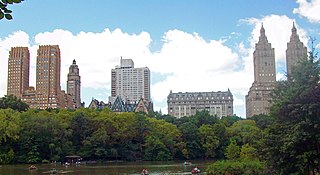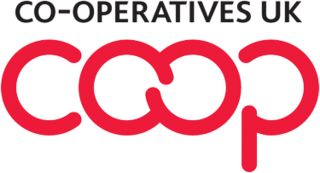
A cooperative is "an autonomous association of persons united voluntarily to meet their common economic, social and cultural needs and aspirations through a jointly owned and democratically-controlled enterprise". Cooperatives are democratically controlled by their members, with each member having one vote in electing the board of directors. Cooperatives may include:

A housing cooperative, or housing co-op, is a legal entity, usually a cooperative or a corporation, which owns real estate, consisting of one or more residential buildings; it is one type of housing tenure. Typically housing cooperatives are owned by shareholders but in some cases they can be owned by a non-profit organization. They are a distinctive form of home ownership that have many characteristics that differ from other residential arrangements such as single family home ownership, condominiums and renting.

The Common Wealth Party (CW) was a socialist political party in the United Kingdom with parliamentary representation from the middle of the Second World War until the year after its end. Thereafter it continued in being, essentially as a pressure group, until 1993.
A worker cooperative is a cooperative owned and self-managed by its workers. This control may mean a firm where every worker-owner participates in decision-making in a democratic fashion, or it may refer to one in which management is elected by every worker-owner who each have one vote.

Employee stock ownership, or employee share ownership, is where a company's employees own shares in that company. US employees typically acquire shares through a share option plan. In the UK, Employee Share Purchase Plans are common, wherein deductions are made from an employee's salary to purchase shares over time. In Australia it is common to have all employee plans that provide employees with $1,000 worth of shares on a tax free basis. Such plans may be selective or all-employee plans. Selective plans are typically only made available to senior executives. All-employee plans offer participation to all employees.
Common ownership refers to holding the assets of an organization, enterprise or community indivisibly rather than in the names of the individual members or groups of members as common property.
The United Kingdom is home to a widespread and diverse co-operative movement, with over 7,000 registered co-operatives owned by 17 million individual members and which contribute £34bn a year to the British economy. Modern co-operation started with the Rochdale Pioneers' shop in the northern English town of Rochdale in 1844, though the history of co-operation in Britain can be traced back to before 1800. The British co-operative movement is most commonly associated with The Co-operative brand which has been adopted by several large consumers' co-operative societies; however, there are many thousands of registered co-operative businesses operating in the UK. Alongside these consumers' co-operatives, there exist many prominent agricultural co-operatives (621), co-operative housing providers (619), health and social care cooperatives (111), cooperative schools (834), retail co-operatives, co-operatively run community energy projects, football supporters' trusts, credit unions, and worker-owned businesses.

A company, abbreviated as co., is a legal entity representing an association of people, whether natural, legal or a mixture of both, with a specific objective. Company members share a common purpose and unite to achieve specific, declared goals. Companies take various forms, such as:

Co-operatives UK is a British co-operative federation described as "the central membership organisation for co-operative enterprise throughout the UK". It was founded in 1870 as the Co-operative Central Board, changing its name to the Co-operative Union before finally becoming Co-operatives UK following its merger with the Industrial Common Ownership Movement (ICOM) in 2001. Historically associated with the consumer co-operatives, the merger broadened its scope to include worker co-operatives and it now exists to support and promote the values of the entire co-operative movement throughout the UK.
Industrial Common Ownership Movement (ICOM) was a UK national umbrella organisation for worker cooperatives, set up in 1971. It worked to increase the number of worker co-ops in the country. ICOM's model rules for cooperatives, published in 1976, were based on a de-centralised and collectivist concept of democracy. In 2001 ICOM merged with the Co-operative Union to become Co-operatives UK.
Anglia Regional Co-operative Society Limited was the fifth largest consumer co-operative in the United Kingdom. It was formed by the merger of the Greater Peterborough Regional and Anglia co-operative societies in 1987. The Society had over 80 stores, principally trading in East Anglia. Head office was located at Westgate House, Peterborough until 2011.

Unicorn Grocery is a co-operative grocery store located in Chorlton-cum-Hardy, Manchester, England. As a workers co-op, it is controlled democratically by its members/owners, who run the business with a flat management structure and with an equal rate of pay. Ethics form the foundations of the business, and Unicorn's Principles of Purpose are the framework within which the business operates.
Workplace democracy is the application of democracy in various forms to the workplace. It can be implemented in a variety of ways, depending on the size, culture, and other variables of an organization.
Commsave Credit Union Limited is a not-for-profit member-owned financial co-operative, based in Northampton in the English Midlands. In 2020, it absorbed Northamptonshire Credit Union. As at 31 March 2021, Commsave has 30,875 members with over £90m worth of savings and £45m on loan to members.

Greencity Wholefoods is a worker co-operative wholefoods wholesaler in Glasgow, Scotland. The co-operative was founded in 1978 in Hillington, in the outskirts of Glasgow before moving in 1983 to its current location in Dennistoun in the city's East End. In 2019 the co-operative reported an annual turnover of £7.7 million and has 54 employee-members.
Quay Co-operative (Cork) Limited, trading as Quay Co-op, is a worker cooperative operating a number of organic, vegetarian wholefoods shops, coffee docks and a restaurant in Cork City and County Cork.







